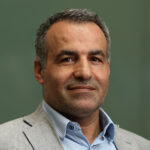Microsoft AI Economy Institute
The Microsoft AI Economy Institute (AIEI) is a pioneering corporate think tank dedicated to advancing independent research and developing actionable solutions that can help societies worldwide positively adapt to the economic and social transformations brought by artificial intelligence.
The institute convenes leading multidisciplinary experts from various sectors, including researchers, international organization specialists, business leaders, and policymakers, to address the critical questions of our time.

A new opportunity to shape the future of the AI economy
We’re getting ready to launch the next cohort of AI Economy Institute senior fellows—and we want you to be part of it.
The upcoming open call will invite bold, interdisciplinary proposals that help advance our understanding of AI’s role in shaping economic systems. We’re committed to supporting research that explores how AI can benefit everyone.
Interested in learning more? Sign up to be the first to hear when the call officially opens—we’ll be reaching out soon with details.
Meet the first cohort of AIEI senior fellows
As AI reshapes the global economy, higher education will be crucial in preparing society for these changes. The AI Economy Institute’s first research cohort is studying how colleges and universities can lead this transformation by examining shifts in university structures, curricula, professional training, and their roles in the workforce. With 14 project teams and 24 scholars from various backgrounds, the Institute seeks to provide practical insights for policy and collaborative action among academia, industry, and government on the future of education and workforce.

Dr. Adam Cannon, Columbia University
Dr. Adam Cannon is a computer science faculty member at Columbia University, where he develops and teaches large undergraduate courses for both majors and non-majors. He has contributed to curriculum design at the departmental, school, and university levels, and chaired the development committee for the AP Computer Science Principles Exam. His current focus is on teaching computer science and AI literacy to liberal arts and humanities students. In 2000 he joined Columbia and also served as a visiting scientist at Los Alamos National Laboratory, where his research focused on machine learning methods for building data-dependent hypothesis classes. He holds a BS and MS in aerospace engineering from the University of California and a PhD in applied mathematics from Johns Hopkins University.

Dr. Vishal Misra, Columbia University
Vishal Misra is a Professor of Computer Science and Electrical Engineering at Columbia University and Vice Dean for Computing and AI in the School of Engineering. An ACM and IEEE Fellow, his research focuses on mathematical modeling of systems, bridging practice and analysis. As a graduate student, he co-founded CricInfo, later acquired by ESPN. In 2021, he developed one of the first commercial applications using GPT-3 for ESPNcricinfo and has since modeled LLM behavior. He played a key role in India’s Net Neutrality regulation, with his definition adopted by both activists and regulators. He received Distinguished Alumnus honors from IIT Bombay (2019) and UMass Amherst (2014).
Project 1: “The Evolution of CS Education: Integrating AI as a Foundational Element” aims to revolutionize computer science education by embedding artificial intelligence throughout the curriculum. Its primary goals include developing an open-source framework for interdisciplinary AI education, deploying AI-powered teaching assistants, and establishing metrics to measure the effectiveness of AI-integrated education. This initiative seeks to prepare students for the future by equipping them with essential AI skills and knowledge.

Jeffrey Oakman, Princeton University
Jeffrey Oakman joined the Provost’s Office in September 2024 to lead the creation of the New Jersey AI Hub at Princeton. Collaborating with partners including the NJ Economic Development Authority, Microsoft, and CoreWeave, he is guiding efforts to position Princeton and New Jersey as leaders in AI innovation. The Hub will support advanced AI research, regional economic growth, workforce development, public sector guidance, and startup formation. Previously, Oakman served as a Senior Policy Advisor in Governor Murphy’s Administration, focusing on economic and community development. He holds degrees from Rice University and Princeton SPIA, where he also served as Associate Director of the Graduate Program from 2016 to 2019.

Jennifer Rexford, Princeton University
As Provost of Princeton University, Dr. Jennifer Rexford oversees the academic mission and long-term financial health of the institution. A 1991 Princeton graduate, she is the Gordon Y.S. Wu Professor in Engineering. After earning her PhD in electrical engineering and computer science from the University of Michigan, she spent over eight years at AT&T Labs, where she developed techniques used in backbone networks. She joined Princeton’s Department of Computer Science as a full professor in 2005, became department chair in 2015, and received her named professorship in 2012. Her research focuses on computer networking, with a broader goal of making the Internet more trustworthy and reliable.
Project 2: “Leveraging Artificial Intelligence to Transform Sectors and Reimagine Jobs Throughout the Economy” highlights the partnership between Princeton University, the New Jersey AI Hub, Microsoft, and CoreWeave to promote AI research, commercialize innovation, and strengthen AI education and workforce development. The project emphasizes the importance of human talent in sustaining an AI ecosystem and outlines plans to develop and share AI curricula, provide industry-recognized credentials, and offer customized upskilling training for workers. The ultimate goal is to grow the AI talent pool in New Jersey, support the state’s tech economy, and ensure that education and training programs meet industry needs.

Dr. Matthew Connelly, Columbia University
Dr. Matthew Connelly is a Professor of International and Global History and Vice Dean of AI initiatives at Columbia University. He co-led Columbia’s Institute for Social and Economic Research and Policy and directs History Lab, which uses data science to study state secrecy, focusing on intelligence, surveillance, and weapons of mass destruction. Prior to that, he directed the Hertog Global Strategy Initiative on planetary threats. His publications include “A Diplomatic Revolution: Algeria’s Fight for Independence and the Origins of the Post-Cold War Era,” which won five prizes, and “Fatal Misconception: The Struggle to Control World Population,” an Economist and Financial Times book of the year. His research appears in journals such as Nature Human Behaviour, Annals of Applied Statistics, and Comparative Studies in Society and History.

Dr. SJ Beard, University of Cambridge
Dr. SJ Beard is a leading researcher in the transdisciplinary field of Existential Risk Studies, focusing on global catastrophic risks, future ethics, and building existential hope. Their work explores systemic threats from transformative technologies and environmental breakdown, and they co-authored Double Debt Disaster on injustice and disaster recovery. Beard has edited two volumes on existential risk and is writing a monograph on existential hope. They are a Borysiewicz Interdisciplinary Fellow, advisor to the UK’s All-Party Parliamentary Group for Future Generations, BBC New Generation Thinker, and editorial board member of Futures. Their media work includes BBC programs and appearances on Newsnight, Analysis, and The Naked Scientists.
Project 3: “AI and the Transformation of Higher Education: An Integrated Approach” explores the integration of artificial intelligence into academia, highlighting both opportunities and challenges. It discusses how AI is transforming higher education from the bottom up, with students and researchers already using AI in various ways. The document emphasizes the need for interdisciplinary approaches to AI education, integrating humanities and social sciences with computer science. It also examines the perceptions, adoption, and regulation of AI in higher education, and proposes strategies for universities to adopt going forward. The project aims to analyze current AI practices, incentivize best practices, and prepare students for the future AI economy.

Dr. Morgan Frank, University of Pittsburgh
Dr. Morgan Frank is an Assistant Professor at the School of Computing and Information at the University of Pittsburgh in the Department of Informatics and Networked Systems. He is interested in the complexity of AI, the future of work, and the socio-economic consequences of technological change. While many studies focus on phenotypic labor trends, Dr. Frank’s recent research examines how genotypic skill-level processes around AI impact individuals and society. Combining labor research with investigations into the nature of AI research and the social or societal implications of AI adoption, he hopes to inform our understanding of AI’s impact. Dr. Frank has a PhD from MIT’s Media Lab, was a postdoc at MIT Institute for Data, Systems, and Society (IDSS) and the MIT Initiative on the Digital Economy (IDE) and has a master’s degree in applied mathematics from the University of Vermont.
Project 4: “Evaluating College Education in the Age of LLMs” explores the impact of large language models (LLMs) on college education and career outcomes. It aims to identify college majors and institutions teaching materials that LLMs might automate, assess the early-career outcomes of graduates exposed to LLMs, and determine whether LLM exposure in higher education is beneficial or detrimental to student outcomes. The project uses millions of university course syllabi and worker resumes to analyze the relationship between LLM exposure and career success, providing insights for students, educators, and employers on the evolving role of college education in the labor market.

Dr. Robert Seamans, NYU Stern School of Business
Dr. Robert Seamans is a Professor at New York University’s Stern School of Business, where he teaches courses in game theory and strategy. His research focuses on how firms use technology in their strategic interactions with each other, and also on the economic consequences of AI, robotics, and other advanced technologies. His research has been published in leading academic journals and cited in numerous outlets, including The Atlantic, Forbes, Harvard Business Review, The New York Times, The Wall Street Journal, and others. Dr. Seamans is also Director of the Center for the Future of Management. In 2015, he was appointed as the Senior Economist for technology and innovation on President Obama’s Council of Economic Advisers. He holds a PhD from UC Berkeley.

Dr. Arun Sundararajan, NYU Stern School of Business
Dr. Arun Sundararajan is the Harold Price Professor of Entrepreneurship and Professor of Technology, Operations, and Statistics at NYU Stern School of Business, where he also directs the Fubon Center for Technology, Business, and Innovation, and teaches about AI, digital strategy, and entrepreneurship. His award-winning book, “The Sharing Economy,” has been translated into multiple languages. He co-chairs the World Economic Forum’s Global Future Council on Data Frontiers and is an expert on the economics of digital goods, network effects, and the regulation of AI and digital platforms. He has published over 50 scientific papers and more than 40 op-eds in major outlets, and his work has earned numerous awards.
Project 5: “Bots and Business School: Lessons for Business Schools in the Era of Generative AI” outlines a project aimed at integrating generative AI tools into undergraduate business school curricula to better prepare students for the AI-enabled workforce. The proposal highlights the need for educational institutions to address labor market frictions caused by rapid AI advancements and aims to develop principles for using AI in classrooms. The project involves piloting an AI-enabled tool to teach students how to effectively collaborate with AI, focusing on prompt engineering and framing questions. The study will gather data from pilot courses to inform recommendations for integrating AI into business education, ultimately benefiting students, companies, and society.

Dr. Amy J. Ko, University of Washington
Dr. Amy J. Ko is a Professor at the University of Washington Information School and the Paul G. Allen School of Computer Science and Engineering. She co-directs the UW Center for Learning, Computing, and Imagination, where she studies computing education, human-computer interaction, and humanity’s individual and collective struggle to understand computing and harness it for creativity, equity, and justice. Alongside her collaborators, she has influenced K–12 computer science education policy at local, state, and federal levels. Her work spans more than 140 peer-reviewed publications, with 22 distinguished paper awards and 6 most influential paper awards. She is an ACM Distinguished Member and a member of the SIGCHI Academy. She received her PhD at the Human-Computer Interaction Institute at Carnegie Mellon University and has degrees in Computer Science and Psychology with Honors from Oregon State University.

Dr. Benjamin Shapiro, University of Washington
Dr. R. Benjamin Shapiro is an Associate Professor and the Associate Director for Community in the Paul G. Allen School of Computer Science & Engineering and in Human-Centered Design & Engineering and Learning Sciences & Human Development at the University of Washington (UW), where he is also co-director of the Center for Learning, Computing, and Imagination. Ben is a learning scientist, and his research concentrates on developing ways for youth and adults to create and use computational media for creative expression, investigation of the world around them, and making positive social change. His award-winning, inter- and trans-disciplinary research engages with topics ranging from AI education and research ethics to feminist re-imagination of science and art education. He earned his PhD in Learning Sciences from Northwestern University and his B.A. in Independent Studies from UC San Diego.
Project 6: “Imagining Education Futures with Generative AI” explores how generative AI can transform education by integrating it into academic disciplines related to data and software creation and governance. It includes conducting interviews with higher education faculty to understand current practices and their visions for the future and hosting a future workshop to develop possible visions for education with generative AI. The project aims to provide insights into possible, necessary, and desirable futures for education, what faculty have tried so far, and the resources needed for institutional change.

Dr. Karl Gunther, University of Florida
Dr. Karl Gunther is a historian of the English Reformation. He earned his B.A. in Philosophy and History from Wheaton College (IL), and his M.A. and PhD in History from Northwestern University. His publications include the book Reformation Unbound: Protestant Visions of Reform in England, 1525–1590 (Cambridge University Press, 2014), which was a finalist for the Royal Historical Society’s Whitfield Prize and runner-up for the American Society of Church History’s Brewer Prize. A fellow of the Royal Historical Society, he has also served as President of the Southern Conference on British Studies. Dr. Gunther was previously Associate Professor of History at the University of Miami, where he taught for fifteen years and held roles including Director of Undergraduate Studies, co-convener of the Medieval and Early Modern Studies Research Group, and chair of the Faculty Senate’s Student Affairs Committee.

Dr. Daniel Maxwell, University of Florida
Dr. Daniel Maxwell is a humanist at heart, having graduated from a small liberal arts college in Eastern Washington with double majors in History and French. Although his career has focused on technology, Daniel remains committed to the idea and values of a classical liberal arts education. To that end, he positions his work at the intersection of technology and the humanities. Dr. Maxwell is skilled in research system design and open science technologies, including Python, SQL, GitHub, Linux, and deep learning frameworks (PyTorch & TensorFlow). He enjoys helping scholars improve their research workflows through the judicious application of artificial intelligence. Daniel also loves learning Italian and is a student of Italian Renaissance culture, art, and literature.
Project 7: “Designing Interdisciplinary AI Systems: Challenges and Collaborative Solutions” discusses the development of generative AI systems and their impact on various sectors, including higher education. It highlights the skepticism among humanities and social sciences faculty towards AI, emphasizing the need for a proactive and collaborative approach to AI system design. The project aims to develop a model for interdisciplinary AI systems by engaging faculty in focus groups to identify their needs and challenges. The goal is to create AI tools that support teaching and research in the humanities and social sciences, ultimately integrating AI into the curriculum to equip students with essential AI competencies.

Dr. Xiaopeng Zhao, University of Tennessee
Dr. Xiaopeng Zhao is a Professor of Mechanical, Aerospace, and Biomedical Engineering at the University of Tennessee, Knoxville, specializing in AI and robotics, particularly in healthcare and education. With over 20 years of academic and research experience, he has led innovative AI-driven projects developing assistive technologies to improve life for individuals with disabilities and their caregivers. As founding director of the Applied AI Program at UTK, Dr. Zhao helped establish interdisciplinary AI research and education, fostering collaboration across engineering, healthcare, and policy. He currently serves as an AAAS Congressional Science & Technology Policy Fellow, engaging in legislative work on AI, technology, education, and policy. His expertise bridges academic research, policy, and real-world AI implementation.

Dr. Mehmet Aydeniz, University of Tennessee
Dr. Mehmet Aydeniz is a Professor of STEM Education and a faculty fellow in the College of Emerging and Collaborative Studies at the University of Tennessee, Knoxville (UTK), where he leads research on innovation in teaching and learning across the K–16 continuum. His work focuses on equipping educators and students with the skills needed in a data-driven, AI-powered world. He has published extensively on inquiry-based science education, teacher development, and equity in STEM. He founded COLABS, a research initiative examining scientific collaboration across boundaries. His current research explores how AI integration drives skill turnover and informs curriculum and workforce strategies. He also hosts Navigating Tomorrow Today in Higher Education, a webinar series spotlighting bold ideas for institutional innovation.
Project 8: “Bridging AI Fluency and Workforce Readiness” focuses on advancing AI education and workforce readiness to meet the demands of an AI-driven economy. As AI transforms industries, there is a growing need for education models that equip students with essential AI fluency and interdisciplinary applications beyond coding. This project explores how universities can better prepare students for AI-integrated careers, ensuring they gain the knowledge and competencies needed for a rapidly evolving workforce. The research supports curriculum innovation, industry alignment, and policy development, helping bridge the gap between education and real-world AI applications. It leverages UT Knoxville’s BS in Applied AI (BSAAI) program as a scalable model for AI education.

Dr. Bassel Daher, Texas A&M Energy Institute
Dr. Bassel Daher is Assistant Director for Sustainable Development at the Texas A&M Energy Institute, Adjunct Assistant Professor of Biological & Agricultural Engineering, and a Research Fellow at the Institute for Science, Technology, and Public Policy. His work applies systems thinking to global challenges such as food system transformation, energy transition, water management, disaster risk reduction, planetary health, and climate action. He promotes evidence-based, cross-sector collaboration to advance sustainable and equitable futures. Daher integrates research, education, network-building, and community engagement, contributing to over $8 million in funding and 70 highly cited publications. He is a frequent international speaker, including a TEDx Talk, and has held research roles at Texas A&M, Purdue, and Qatar Foundation. He serves on the Executive Board of the International Water Resources Association and co-chaired the Zero Hunger Pathways Project (2020–2023).

Dr. Konstantinos Pappas, Texas A&M Energy Institute
Dr. Konstantinos Pappas is the Associate Director of the Texas A&M Energy Institute. In his 28-year career, he has held senior roles in program management, policy development, and research, including within the European Commission, where he integrated environmental and resource considerations into sustainable development frameworks. Since 2018, he has overseen major projects emphasizing stakeholder engagement in areas such as Carbon Capture and Renewable Technologies. Dr. Pappas’s research focuses on migration economics, international development and sustainability, the societal impacts of energy transition, and stakeholder engagement. Through collaborations with the United Nations Disaster Risk Reduction Office and NATO, his work in the last four years has addressed the interconnected challenges of water, energy, and food in the context of climate change, human mobility, and security.
Project 9: “The Evolving Role of Universities in the AI Era: Opportunities for Improving AI Literacy Through Micro-credentials and Interdisciplinary Curriculum Design” explores how universities can bridge the growing AI skills gap by integrating relevant competencies into curricula. It emphasizes micro-credentialing and interdisciplinary design to equip students with essential skills like big data analysis, machine learning, and AI ethics. The study aims to identify in-demand skills, develop comprehensive education frameworks, and draw insights from successful interdisciplinary programs. It seeks to align academic training with workforce needs, foster academia-industry collaboration, and shape policies for skilling, upskilling, and reskilling in the AI-driven economy. The project is led by Dr. Bassel Daher and includes Kostas Pappas, Rabi Mohtar, Silva Hamie, Khalil Dirani, Mishaal Ashkanani, and Stratos Pistikopoulos.

Dr. Kenneth R. Fleischmann, The University of Texas at Austin
Dr. Kenneth R. Fleischmann is a Professor in the School of Information at The University of Texas at Austin. He is the Founding Chair of the Executive Team for Good Systems, a UT Grand Challenge, and the Founding Director of Undergraduate Studies for the iSchool’s B.A./B.S. in Informatics. His research and teaching focus on AI ethics and the role of human values in designing and using information technologies. His work has been funded by the National Science Foundation (NSF), IARPA, Microsoft Research, Cisco Research, Micron Foundation, and the Public Interest Technology University Network. His research has earned awards including the iConference Best Paper Award, ASIS&T SIG-USE Best Information Behavior Conference Paper Award, ALA Library Instruction Round Table Top Twenty Articles, ASIS&T SIG-SI Social Informatics Best Paper Award, ASIS&T SIG-AI Artificial Intelligence Best Paper Award, the Civic Futures Award, and the MetroLab Innovation of the Month Award. He is also the Founding Editor-in-Chief of the ACM Journal on Responsible Computing.
Project 10: “Centering Ethics in the AI Curriculum: Scaling Up AI Ethics Education Nationwide” explores the importance of integrating ethics into AI education. It highlights the ethical challenges posed by AI systems and the need for AI professionals to understand these implications. The project is based upon the recent successful launch of UT Austin’s online M.S. in AI program, which includes a required course on Ethics in AI, and outlines plans to scale this education model nationwide. The research involves surveys and interviews with students to assess the impact of the ethics course and aims to establish a national standard for AI ethics education.

Dr. Leo Porter, University of California, San Diego
Dr. Leo Porter is a Professor in the Computer Science and Engineering Department at UC San Diego. He is best known for his research on the impact of Peer Instruction in computing courses, the use of clicker data to predict student outcomes, and the development of the Basic Data Structures Concept Inventory. He co-wrote the first book on integrating LLMs into the instruction of programming with Daniel Zingaro, entitled “Learn AI-Assisted Python Programming: With GitHub Copilot and ChatGPT”. He has received six Best Paper Awards, SIGCSE 50th Anniversary Top Ten Symposium Papers of All Time Award, the Outstanding Teaching Award from Warren College, and the Academic Senate Distinguished Teaching Award at UC San Diego. He is a Distinguished Member of the ACM, recently served as Secretary of the SIGCSE Board, and presently serves as Program Chair for ICER.

Dr. Daniel Zingaro, University of Toronto
Dr. Daniel Zingaro is an Associate Teaching Professor at the University of Toronto. He has taught introductory Python programming to thousands of students over the past 15 years and has written both no-GenAI and, with Leo Porter, GenAI Python textbooks. Dan has also authored and co-authored textbooks on algorithms and competitive programming and incorporates as much research-backed instruction as he can into his writing. He is the recipient of the SIGCSE 50th Anniversary Top Ten Symposium Papers of All Time Award, an ICER Best Paper award, and the Computer Science Canada Excellence in Teaching Award.
Project 11: “How Introductory Programming Students Use Generative AI While Coding” aims to understand how introductory programming students use Generative AI (GenAI) tools while coding, particularly in large, multi-function projects. The study will investigate the skills students employ, the challenges they face, and the effectiveness of their interactions with GenAI after receiving explicit instruction on using these tools. The research will be conducted in two parts. In the first part, the researchers will conduct an interview study to explore students’ interactions and skills using GenAI. The second part will be informed by the findings from the first part, aimed at assessing the impact of teaching specific skills on student outcomes. The findings are expected to inform future instructional practices and improve how students use GenAI when completing authentic projects.

Dr. Stephanie Moore, University of New Mexico
Dr. Stephanie Moore is an Associate Professor in the Organization, Information, and Learning Sciences program and a Barbara Bush Foundation / Dollar General Foundation Fellow. Her research focuses on technology use in adult reading, digital literacies, online and blended learning design, and the ethics of technology in education and the workplace, including AI. Previously, Dr. Moore was an Assistant Professor at the University of Virginia, where she taught instructional design and ethics for learning technologies. She has received multiple awards including the AACTE Innovation of the Year Award and the Leadership in Education award, led and developed award-winning programs, and held leadership roles in AECT. She is Editor-in-Chief of the Journal of Computing in Higher Education and consults globally through the U.S. Department of State’s US Speakers Program, advising embassies on effective digital learning strategies.

Dr. Victor Law, University of New Mexico
Dr. Victor Law is an Associate Professor and Program Director of the Organization, Information, and Learning Sciences (OILS) Program at the University of New Mexico. He has extensive expertise in educational psychology, instructional technology, and the application of technology in learning environments. Dr. Law holds a PhD in Educational Psychology with a concentration in Instructional Psychology & Technology from the University of Oklahoma. His research interests include artificial intelligence in education, ill-structured problem solving, computer-supported collaborative learning, self-regulation, game-based learning, and the adoption and use of technology in education. He has published in top journals and served on the editorial board of major journals such as Educational Technology Research and Development and Interdisciplinary Journal of Problem-Based Learning.
Project 12: “Creating Inter-disciplinary Educational Pathways for AI Leadership” aims to develop an AI for All course using high-quality open resources and a separate course on AI in Work and Learning, focusing on AI’s applications and implications in organizational and workplace learning. The broader goal is to foster AI literacy, interdisciplinary collaboration, and ethical decision-making. Research goals include documenting design knowledge, establishing strategies for AI literacy, and examining how ethics can be integrated into AIS development. The project uses a design-based research approach to document the design and development of these courses. As background, the University of New Mexico is developing a 15-credit graduate certificate in responsive and resilient AIS engineering, which includes research on AI and autonomy, core courses on AIS ethics, and project-based collaborations with external partners. Initially targeting students in computer science, electrical, mechanical, and systems engineering, the program plans to expand to other disciplines.

Dr. Fabian Stephany, University of Oxford
Dr. Fabian Stephany is a Departmental Research Lecturer in AI & Work at the Oxford Internet Institute, University of Oxford, and a Research Affiliate at the Humboldt Institute in Berlin. He leads the SkillScale Project, exploring emerging skills and sustainable occupations amid tech disruption. He co-created the Online Labour Observatory with the ILO. His work has been published in top journals and featured in major media like The New York Times and Nikkei Asia. Dr. Stephany holds a PhD and degrees from institutions including Università Bocconi and the University of Cambridge and has worked with the UNDP, World Bank, and OECD.

Dr. Ole Teutloff, University of Oxford
Dr. Ole Teutloff is an incoming postdoctoral researcher at the Oxford Internet Institute and is affiliated with the Copenhagen Center for Social Data Science. His research uses computational social science methods to study the impact of technological innovations on society. Ole’s work particularly focuses on the labor market implications of transformative AI and the effects of technological change on inequality. He holds a PhD in Social Data Science from the University of Copenhagen, an MSc in Social Data Science from the University of Oxford, and a Master of Public Policy from the Hertie School in Berlin. Previously, he has worked in various international contexts including the Centre for the Governance of AI, the OECD, and the World Bank.
Project 13: Bridging the AI Skills Gap: Examining AI Literacy, Reskilling Pathways, and Micro-Credentials in the US and UK” addresses the widening digital skill disparities due to the rapid advancement of AI technologies. It highlights the economic inequalities and workforce adaptability challenges faced by workers in the US and UK, particularly among Black, Hispanic, older, and economically disadvantaged groups.

Dr. Jeffrey Nii Armah Aryee, Kwame Nkrumah University of Science and Technology
Dr. Jeffrey Nii Armah Aryee is a Lecturer in the Department of Meteorology and Climate Science at Kwame Nkrumah University of Science and Technology (KNUST) in Kumasi, Ghana. He holds a PhD in Meteorology and Climate Science from KNUST, completed under the European Union’s 7th Framework Programme funded DACCIWA (Dynamics-Aerosol-Chemistry-Cloud-Interactions in West Africa) Project. Dr. Aryee’s research interests include climate data reconstruction, boundary-layer meteorology, climate variability and change, ML/AI applications in climate science and climate impact studies. He is the Lead for the JNAA research group (JNAA Lab) and served as the satellite data scientist for the KNUST cohort of the GCRF African SWIFT (Science for Weather Information and Forecasting Techniques) Project. Dr. Aryee is the PI for the ANDeL (Advancing Nowcasting with Deep Learning techniques), Ghana AQ Data Hub and TechAir projects. He also collaborates with an extensive scientific community on other projects such as the EW4ENERGY (Early Warning for Energy) project. He is also the group lead for PY4CA, a scientific computing solutions team involved in building science-related problem-based solutions and applications.
Project 14: “Revolutionizing Tertiary Education for Africa’s Thriving AI Economy and Workforce (RetAIn) Project: Expanding Access to AI Education, Fluency, and Workforce Training” outlines a comprehensive initiative aimed at enhancing AI education and workforce training in Africa. It emphasizes the need for education systems to adapt to the rapidly evolving AI economy, highlighting Africa’s potential to become a leader in this field despite systemic barriers. The RetAIn project aims to equip students with relevant skills, promote innovation and job creation through partnerships, and contribute to an inclusive AI economy. The project involves assessing curriculum relevance, analyzing workforce demands, strengthening university-industry linkages, expanding access to AI education, leveraging AI to enhance learning, and developing policy recommendations for equitable AI workforce development.

